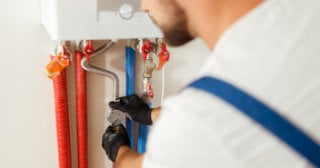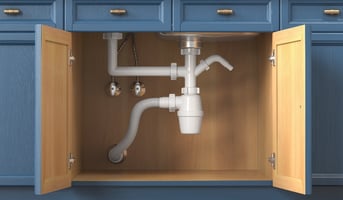Protect your plumbing
Frozen pipes can burst and lead to water damage and other expensive home repairs. Before temperatures drop below freezing, you should:
- Disconnect all water hoses from exterior faucets. Be sure all water is drained from the hoses, then coil and store them.
- Insulate exterior pipes and faucets using foam covers.
- Use an air compressor or hire a professional to do a “blow out” if you have an in-ground sprinkler system. This will remove standing water and prevent underground pipes from freezing and bursting.
- Be sure everyone in your household knows how to turn off your home’s main water source in case a pipe does burst. Quickly turning off the water can make a big difference in the amount of water damage a leaky pipe can cause.
Check your heat sources
Fireplaces and furnaces keep homes toasty on cold winter days, but they can be hazardous if not properly maintained. In advance of wintery weather, be sure to:
- Check your chimney if you have a wood-burning fireplace. Debris and birds’ nests can block chimneys, and creosote can build up inside chimneys, which can lead to fires. Properly reducing creosote buildup by hiring a certified chimney sweep can help your fireplace burn hot, clean fires.
- Change your furnace filter. You should perform this task every two to three months during the year, but it is especially important before peak furnace season because dirty filters can damage your furnace fan and cause utility bills to soar.
- Keep hot air in and your heating bill down by making sure doors and windows are properly sealed. You can best detect air leaks on a windy day when you can feel drafts along window and door perimeters. Fix window leaks using inexpensive rope caulk from a home improvement store, and easily seal doors by applying weatherstripping on the sides and bottoms.
Don’t forget roofs and gutters
Imagine thawing out from a winter storm and hearing a “drip, drip, drip” sound inside your home — only to realize you have a leaky roof. Roofs must be in good condition to stand up to the weight and excessive moisture that accompanies snow and ice accumulation. Avoid disaster by carefully inspecting or hiring a professional to inspect your roofing for missing shingles before winter hits. Be sure to also check areas around vent stacks and chimneys — other major sources of leaks — and have any repairs made well in advance of cold or snow.
Also check gutters and downspouts and clean them thoroughly. Debris such as wet leaves and pine needles can add substantial weight inside gutters, which can lead to damage when it freezes.
Know what’s covered in your insurance policy
With all the home hazards the season poses, it’s good to know what your homeowners or renters insurance policy covers in advance of winter’s arrival. Homeowners and renters alike should review their policies with an experienced agent to ensure they have sufficient coverage to protect against winter dangers. Know in advance what is — and is not — covered so you can add any additional coverage that makes financial sense to protect you and your home against winter’s wrath.





